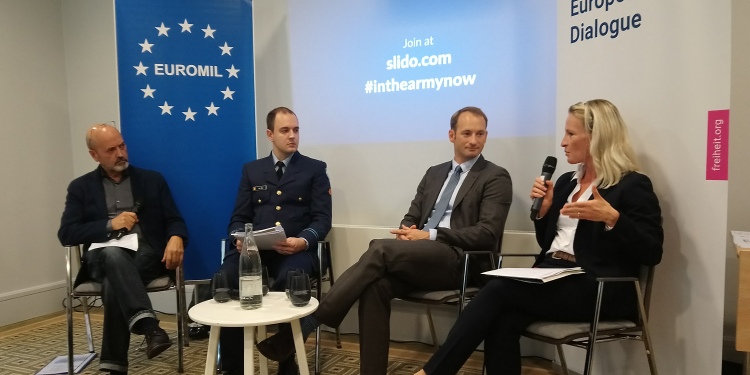EU Citizens in National Armed Forces – Solving the Recruitment Challenge?
On 15 October 2019, EUROMIL organised an event on EU Citizens in National Armed Forces in cooperation with the Friedrich Naumann Foundation for Freedom (FNF).
Opening the discussion, Emmanuel Jacob, EUROMIL President, explained that armed forces all over Europe are facing recruitment challenges. As a response to personnel shortages, some countries are discussing or have reintroduced conscriptions. Others started expensive recruitment campaigns to promote a career in the armed forces. And in some countries, the possibility to opening the armed forces to non-nationals is discussed. In Europe, only a few countries have fully opened their national armed forces to EU-citizens. Other countries restrict the career options of non-nationals in the armed forces or open their military for citizens of former colonies or countries with the same native language. Experiences from these countries show overall positive effects. President Jacob highlighted that while EUROMIL has no clear position on the issue and its member associations have different points of view depending largely on their national situations, EUROMIL believes that its worth discussing this issue in Brussels.
Sebastian Vagt, Defence Policy Analyst, FNF Security Expert Hub, kicked-off the debate by expressing is concern that recent European defence policy initiatives like PESCO and the EDF are mainly focusing on capabilities and equipment. Especially in the light of the current personnel shortages, military personnel should be much more in the focus of the discussion. He argued for opening the armed forces to EU citizens: First of all, from the perspective of the employer, this would enlarge the pool of possible recruits. Secondly, from the employee’s perspective, it is a matter of equal employment opportunities on the (European) labour market. In addition, for him, the “moral argument” as to whether a for example Spanish citizen can really swear loyalty to and ultimately defend for example Belgium is a non-issue: Today’s missions and operations are taking place in multinational (European) contexts and are not about defending one country alone, but about securing Europe as a whole.
Robert De Leij, First Lieutenant, Belgian Defence Staff, offered his personal perspective as a Dutch citizen serving in the Belgian armed forces. Having spent most of his life in Belgium, joining the Belgian armed forces was a natural decision for him. He explained that the recruitment procedure is very objective, applying the same standards in terms of physical and mental fitness as well as language proficiency to all candidates. He observed that in the multinational environment the armed forces are operating in today, having a diverse workforce has certain advantages: internally, foreign personnel can enrich the discussions by offering slightly different perspectives and externally, they can facilitate the exchange and cooperation with other countries armed forces.
Miguel Lopez, member of the United Association of Spanish Military (AUME), spoke on his personal behalf when he elaborated on the situation as he sees it in Spain. Here, persons of former colonies and Spanish speaking territories can apply to join the armed forces. As the language requirement is a given, there are no problems when it comes to communicating effectively with all staff. In addition, after having served for two years, foreigners can apply for Spanish citizenship and thus disappear from the count of foreigners in the armed forces by becoming Spanish citizens.
Ildikó Szenci, Senior EU Consultant, moderated the following debate, which touched on a range of issues such as language proficiency requirements prior to joining the armed forces, security screenings and clearances once in service, multinational trainings and the cross-country recognition of military training, as well as different value systems and loyalty. Participants also raised the question whether opening the armed forces to EU-citizens was rather a non-issue in the Brussels-bubble where people are used to thinking in European rather than national terms. On the other hand, the perceptions in member states towards this question might be totally different and much more careful.
While being aware that this issue needs to be decided at national level, EUROMIL welcomed the exchange of views and the positive country examples exchanged during the debate and will continue to monitor this issue closely. The FNF published a policy paper on the issue, which is available here.

